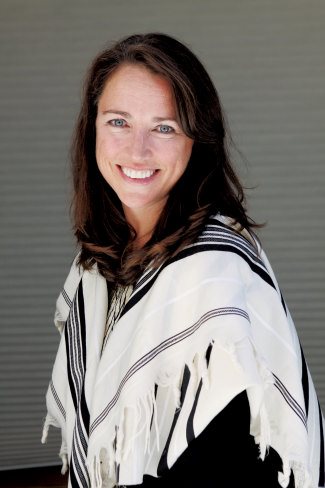By Judy Silk
Palisades News Writer
I recently interviewed Rabbi Amy Bernstein at the home she shares with her 11-year-old daughter Eliana and her partner, Judy Griffith.
SILK: You arrived at Kehillat Israel in 2010. What was it that drew you away from your congregation in Duluth, Minnesota, aside from the obvious cold?
BERNSTEIN: I had met KI’s Rabbi Sheryl Lewart, of blessed memory, while I was a rabbinical student and she sought me out at a national convention. She knew that she was getting ready to retire, and asked me to apply. Since I would be in line to be senior rabbi when Rabbi Reuben eventually retired, I had to ask her if she thought that KI would be ready for an openly gay woman senior rabbi. She said yes, and so I applied and got the job.
SILK: Were you raised as a Reconstructionist?
BERNSTEIN: No. My father had come from an Orthodox family, but was not an observant Jew and my mother was a southern Baptist who chose to convert to marry my father. The irony of growing up that way was that I understood there were lots of ways into Jewish identity and practice. I went to a Jewish Day School, so I got my sense of Jewish identity from my father and his family, and school, and my sense of Jewish practice from my mother.

SILK: When did you transition from Orthodoxy?
BERNSTEIN: At 16. I left the Orthodox yeshiva in Atlanta as my feminist roots were at odds with Orthodox practice. Girls were not allowed to study Talmud, and the boys seemed unappreciative and derisive. And I wanted so much to continue to study in that way.
SILK: You were a little Yentl-like.
BERNSTEIN: Yes. I got all kinds of answers, like “girls are naturally more spiritual than boys so they don’t need to study.” But I was inquisitive, wanting to question and argue and learn. So I left the yeshiva and joined a high school for the performing arts summer program. I auditioned for and got into their touring company. There were 16 of us, and we went across the country. That’s the way I finished high school.
SILK: That sounds very different from what you’d been used to.
BERNSTEIN: I went from a small community to another small community. It was more similar than you would think; we rehearsed, had a cultural identity, rituals. We were a small family.
SILK: Where did you go to college?
BERNSTEIN: I went to Northwestern. I was a double major in English lit and anthropology and I was searching for a way back into religious life. I started participating in Hillel, which is very liberal. But still, it didn’t hit me at my core, as the services were all in English and I was used to a more profound practice. But as a feminist I wasn’t welcome at the Chabad.

SILK: So the very reform worship was too lax and Chabad was too restrictive? Is that when you discovered Reconstructionism?
BERNSTEIN: When I moved back to Atlanta after college, my friends encouraged me to attend a gay and lesbian synagogue. I was skeptical. This was Reconstructionist. I didn’t know what that was. But I was welcomed and brought in. The rabbi was female and was able to perform all the rituals, wore the kippah and prayer shawl, which was not what I was used to from Orthodoxy and Conservative practice. She was also was tone deaf, couldn’t carry a tune in a bucket, so when she learned that I could read Hebrew and I knew all the prayers, and could also chant, she asked me to be Cantor for Yom Kippur services. This the first time I had ever heard a woman’s voice chanting Kol Nidre, the most moving and symbolic piece of music in our liturgy, and it was my own voice. It was a powerful moment. I cried. I knew something had changed.
SILK: Thus must have felt so empowering. What did you do with that?
BERNSTEIN: I was at a time in my life when I had to decide what I was going to do: go to graduate school or continue performing. I knew that I wanted to do something where I could serve people and have a diverse life and something that I could grow with. So I chose to go to the Rabbinical Reconstructionist College in Philadelphia. It wedded the best of what Judaism had to offer: the richness of traditional elements, the ritual, the Hebrew, the melodies, with a socially progressive, egalitarian liberal approach.
SILK: Were you offered the job in Duluth from there?
BERNSTEIN: Yes. The synagogue in Duluth interviewed me by phone while I was in Jerusalem and hired me to be their visiting student rabbi when I returned to Philadelphia. As they met other candidates, they asked me to consider applying. I stayed there for 14 years until I got the offer from KI.
SILK: Any final words, Rabbi Amy?
BERNSTEIN: As I said to our brand new Assistant Rabbi Nick Renner, there isn’t a more meaningful life than one spent serving a community. As hard as the schedule can be, and as demanding as it may be, nothing is more rewarding.
(Editor’s note: Judy Silk traveled through Israel this summer on a tour led by Rabbi Amy Bernstein and Cantor Chayim Frenkel of Kehillat Israel. “One of the highlights of the trip was our arrival at the David Citadel Hotel in the heart of Jerusalem and watching Amy’s face when she saw her name listed as head rabbi of the world’s largest Reconstructionist congregation on a banner on the hotel’s façade,” Silk said.)












You must be logged in to post a comment.